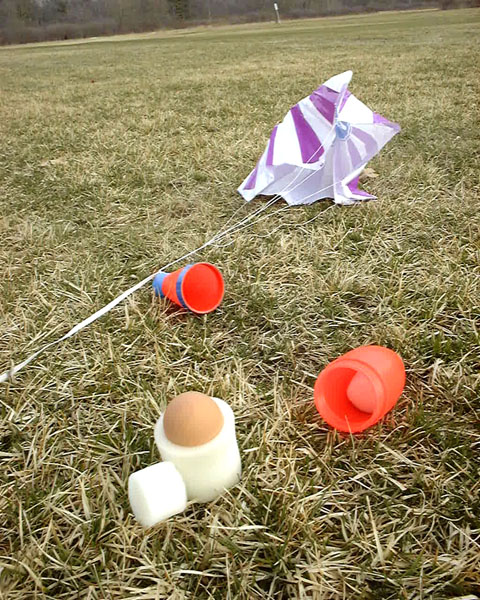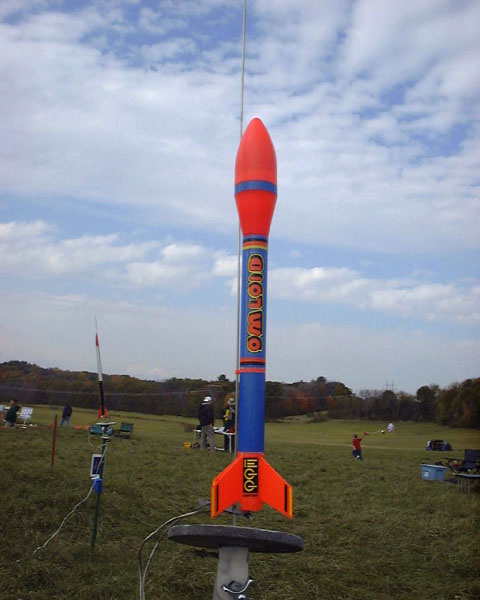
I used to love these things.
Posted on 06/18/2002 10:29:52 AM PDT by RightWhale
Amateurs to Make a Stab at Space With Rocket
By Tariq Malik Staff Writer
posted: 07:00 am ET 18 June 2002
A group of rocketeers hope the next two weeks will put them in the history books with a vehicle that, if successful, would be the first amateur rocket shot into space.
The Civilian Space Xploration Team (CSXT), a collection of rocket jocks, engineers and space enthusiasts around the country, are set to launch their rocket, dubbed Primera Spaceshot 2002, by the end of June from the Black Rock Desert in Nevada.
"We’ve put our hearts and souls into this thing," said CSXT project director Ky Michaelson during a telephone interview. "If we do fail, it isn’t because we didn’t try."
Michaelson said his team, made up of people from around the country, had an original launch date of Sept. 26, 2001, but pushed it back to June following the terrorists attacks of Sept. 11. The exact time and date of the launch is under wraps in order to comply with safety regulations set by the Federal Aviation Administration (FAA), but team leaders say all systems are go.
Launching into history
Primera Spaceshot 2002 is a single stage vehicle powered by solid rocket propellant similar to that used by NASA in the detachable boosters for the space shuttle program. The rocket stands about 17 feet tall (5.18 meters) and weighs 550 pounds (249 kilograms) and is expected to reach an altitude of 62 nautical miles (114 kilometers). That would put the rocket 12 miles higher than the 50-mile altitude largely regarded as the boundary of space.
"I wish them all the luck in the world," said Tom Rouche, a custom homebuilder and avid rocketeer. "The hardest thing they have to do is to keep the rocket from disintegrating and all the electronics working." Rouche is the president of the Association of Experimental Rocketry of the Pacific (AEROPAC) and a onetime competitor of Michaelson’s to put a rocket in space.
Rouse told SPACE.com that the challenge of designing and flying a spacefaring rocket, the need to break records and the idea of being first all play a part in the amateur effort to reach space.
Grassroots efforts to send a vehicle into space were also encouraged by a cash prize. The Cheap Access to Space (CATS) prize offered $250,000 to the first team capable of launching a 4.4-pound (2-kilogram) payload 124 miles (200 kilometers) into space by November 2000. Although many teams entered the competition, including the CSXT team, none were successful.
Michaelson and his team got close to space during a 2000 rocket launch, but ultimately ran short when their vehicle lost a fin at 40,000 feet due to wind sheer. After studying the results of that launch and upgrading the rocket to make it more durable and powerful, project leaders are confident it will do the job.
"In the last launch the time was right, but the performance wasn’t there," said Jerry Larson, Spaceshot’s program manager and an aerospace engineer for Lockheed Martin in Colorado. "What we’ve learned from that has gone into this new rocket."
They call him Rocketman
A native of Bloomington, Minnesota, Michaelson is a 63-year-old semi-retired stuntman first hooked by rockets in 1950, when he discovered black powder using a chemistry set.
A decade later he built a rocket-powered motorcycle, gaining his reputation as the "Rocketman." He has since used rockets to push cars, sleds and snowmobiles, and holds 72 state and national speed records. In 1995, he came across an altitude record for high power rockets (amateur vehicles that go higher and faster than the store-bought Estes models) in a magazine.
"I never thought to do this thing for money," said Michaelson, who also serves as president of the National Experimental Rocketry Association. "The world altitude record was 31,000 feet, and I knew I could beat it."
His first attempt blew up on the launch pad, but successive tries saw flights up to 77,000 feet, and then along came the CATS prize in 1997 and the goal to reach space. Initially, the effort was a pet project of Michaelson and his wife Jodi. Since then, however, he has founded the Spaceshot team with Larson and others, and even found sponsors, like compact and digital video disc manufacturer Primera Technology Inc., after which the rocket gets part of its name.
"When this is all done, I think I’ve really made some good friends," Michaelson said.
To educate, as well as explore
One of the major spin-offs from the Spaceshot project, and other amateur rocketry efforts, is student interest in mathematics and science as a whole. Larson said he and Michaelson routinely visit students, be they toddlers in grade schools or graduate students attending universities, to speak about rocketry.
AEROPAC, Roche added, assists university students launch sounding rockets that reach altitudes of a few thousand feet. The idea, he said, is to give today’s aerospace engineering students hands-on experience with results they can see.
Julia Cohn, a 17-year-old from William H. Hall High School in West Hartford, Connecticut and the only high school student on the Spaceshot 2002 team, has spent the last three years building circuit boards and other materials for the rocket.
"There have been so many things I’ve learned, especially about the team work needed for this project," she said in a telephone interview, adding that although she came from a non-technical background, she’s looking forward to studying electrical engineering in college.
Meanwhile, Michaelson is already looking toward other records he might be able to breach.
"I think an orbital flight is next," he said. "You got any extra nickels you want sent up?"

I used to love these things.
You just insulted my 3-year-old son...
(photo of csxt 2000 attempt:)

LOL!!
There was a big ol' Estes that carried an egg: 
P.S. Go amatuer rocketeers! Someday someone is going to figure out a "Model T" design that's cheap, reliable and effective, and that's going to make it a lot cheaper to put private satellites into orbit. Maybe that will start the second wave of the "Space Age".

Obviously he needs access to the kitchen and the oven. The saltpetre needs to be dry, dry, dry. But not too hot. On the other hand the missus wants a new stove anyway. That's amateur rocketeering until you are banned to the shed AWAY from the house and you can finally become a serious amateur.

Where do we get the saltpetre? And what else do you mix with it?
How ironic that a rocket engine is named Estes.
And, a good argument for ABM systems.
Really john, it's not that hard to find, my children think dad is a blast! ahem! figurativly speaking of course...
Amatures all have to start somewhere!
Disclaimer: Opinions posted on Free Republic are those of the individual posters and do not necessarily represent the opinion of Free Republic or its management. All materials posted herein are protected by copyright law and the exemption for fair use of copyrighted works.